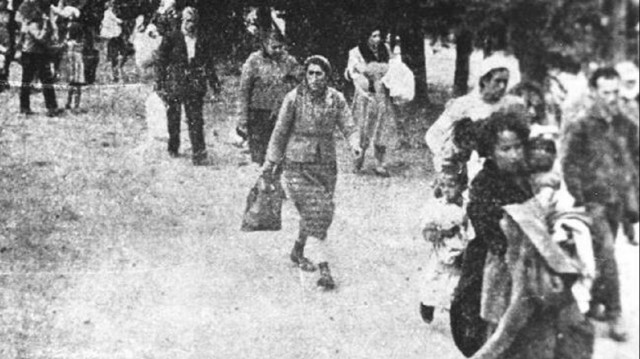
EOKA terror group killed over 370, displaced 25,000-30,000 Turkish Cypriots during Christmas season of 1963
The horrors of deadly, systematic attacks on Turkish Cypriots by extremist Greek Cypriot nationalist terror group EOKA lives on in memory as "Bloody Christmas," 58 years after these events led to hundreds killed and thousands displaced from their ancestral homes.
The events that led to the Bloody Christmas, also called Black Christmas by Turkish Cypriots, started in 1955 with the foundation of EOKA, led by Georgios Grivas, a veteran officer of World War I and World War II, as well as a staunch opponent of communists and Turks.
Active in Cyprus, then ruled by the UK, EOKA targeted not only the British soldiers and civil servants but also Turkish and Greek Cypriots who opposed its extreme ideology and its goal of union with Greece.
Until the foundation of the Republic of Cyprus on Aug. 16, 1960 on the guarantee of the UK, Turkey, and Greece, the death toll of the EOKA's ferocious and deadly terror campaign included at least 104 British soldiers, 54 police officers (among them 15 Greek Cypriots, 22 Turkish Cypriots, and 12 British) and 238 civilians, including 203 Greek Cypriots, seven Turkish Cypriots, and 26 British.[1]
Under this power-sharing regime of the bilingual Republic of Cyprus that adopted both Greek and Turkish as official languages, the island was to be governed under a Greek Cypriot president and Turkish Cypriot vice president, as well as a 10-person cabinet -- seven from the Greek side and three from the Turkish in a proportion that would also be reflected on the bureaucracy, police, and security forces.
While this led many in Ankara and among Turkish Cypriots, who have been present on Cyprus for four centuries, to believe that the Greek political actors were abandoning their maximalist claims on the island and with regard to union with Greece, President Archbishop Makarios and his extreme nationalist team before long started to undermine the republic.
Being of the opinion that Turkish Cypriots had gained excessive privileges, Makarios prevented the full implementation of the constitutional provisions relating to public offices assigned to the Turkish side. Furthermore, from early 1961 on, Greek Cypriots started reviving the EOKA terror group under the name Akritas, also known as secret army EOK, aiming to reverse the Constitution, severely curb Turks' rights, and eventually declare unification with Greece.
The Akritas operated under the guidance of Greek Cypriot officers and used arms obtained from the government armories. On the eve of Bloody Christmas, as many as 10,000 Greek Cypriots were recruited and underwent to weapons training.[2]
Greece's direct and strong support, as well as the ambiguous policies of Western countries including the US and UK, in response to the maximalist demands of the Greek Cypriots further encouraged Makarios to announce on Nov. 30, 1963, a memorandum that demanded 13 amendments to the Constitution that repealed many of the rights of Turkish Cypriots. Turkey, one of the guarantors of the Republic of Cyprus and its constitutional order, as well as Turkish Cypriots, then led by Cypriot Vice President Fazil Kucuk, rejected the amendments.
This prompted EOKA, with the help of many Greek Cypriot members of the police organization, launched an attack on the night of Dec. 20, 1963, against the Turkish quarter of Lefkosa (Nicosia). Storming the home of Turkish military doctor Nihat Ilhan, they killed not only Ilhan's wife Muruvet and three sons, Murat, Kutsi, and Hakan, but also the wife of his landlord, Feride Gudum.
A photograph of the mother and three sons lying dead in the bathroom has since become a symbol of the brutality inflicted by Greek Cypriot extremists.
During EOKA's terror campaign of the 1963 Christmas season, 374 Turkish Cypriots were killed, 109 Turkish villages were forced to evacuate, over 2,500 Turkish houses were severely damaged or demolished, and between 25,000 and 30,000 Turkish Cypriots were became refugees, according to a UN report released on Sep. 10, 1964.[3]

